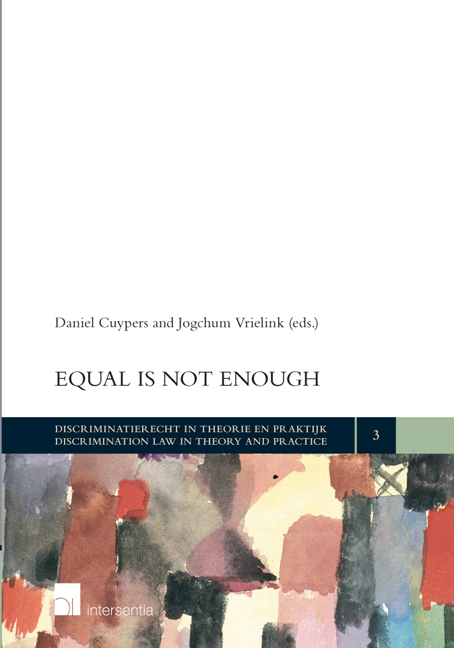Book contents
- Frontmatter
- Contents
- About the Authors
- Introduction
- The Importance of Equality Law and Human Rights in Addressing Socio-Economic Inequality
- Housing Rights and the Inclusion of Roma and Travellers. Towards Positive Action Measures from the Rulings of the European Court of Human Rights?
- The Right to Work of People with Disabilities. The Obligation to Accommodate as an Emanation of the Contemporary Approach to Disability
- Indirect Discrimination, Reasonable Accommodation and Religion
- Reconsidering Civic Integration Policies for Migrants through the Lens of Socio-Economic Status. Examples of Belgian and Dutch Legal Orders
- Does Equality Law Make a Difference? Social Science Research on the Effect of Discrimination Law on (Potential) Victims
- From a ‘Relative’ to a ‘Relational’ Equality: Rethinking Comparability in the Light of Relational Accounts of Social Justice
Does Equality Law Make a Difference? Social Science Research on the Effect of Discrimination Law on (Potential) Victims
Published online by Cambridge University Press: 21 September 2018
- Frontmatter
- Contents
- About the Authors
- Introduction
- The Importance of Equality Law and Human Rights in Addressing Socio-Economic Inequality
- Housing Rights and the Inclusion of Roma and Travellers. Towards Positive Action Measures from the Rulings of the European Court of Human Rights?
- The Right to Work of People with Disabilities. The Obligation to Accommodate as an Emanation of the Contemporary Approach to Disability
- Indirect Discrimination, Reasonable Accommodation and Religion
- Reconsidering Civic Integration Policies for Migrants through the Lens of Socio-Economic Status. Examples of Belgian and Dutch Legal Orders
- Does Equality Law Make a Difference? Social Science Research on the Effect of Discrimination Law on (Potential) Victims
- From a ‘Relative’ to a ‘Relational’ Equality: Rethinking Comparability in the Light of Relational Accounts of Social Justice
Summary
Due to their nature and focus, legal scholarship and legal practice oft en neglect the actual societal effects of legislation. Research from within social sciences can, in this regard, provide a ‘reality check’, by revealing the ‘complex nuances, challenges, and contradictions of the law and its implementation’.
Social scientific research tends to complicate our understanding of important social facts and institutions, such as law, and its basic concepts, such as discrimination. In doing so, it calls into question explicit or implicit assumptions by lawyers and legislators about how humans and human interaction work. Law rarely (if ever) does exactly what it is envisioned to do. Discrimination law is no exception in this regard. Research shows that, at best, discrimination law provides partial protection and beneficial effects in some situations, while, at worst, having counterproductive effects or even inflicting its own harms on those it is supposed to protect.
This chapter focuses on some recent findings from within social sciences regarding discrimination law, and the way it impacts (potential) victims in particular. It will firstly address research concerning the way in which (potential) victims make use of the legislation (or fail to do so), i.e. their claiming and litigation behaviour (section 1). Aft erwards, a number of intended and unintended effects that empirical research suggests discrimination legislation may have on plaintiffs and potential victims are discussed (section 2).
GRIEVANCES, CLAIMING AND LITIGATING IN DISCRIMINATION LAW
What do social sciences tell us about the claiming and litigation behaviour of victims in situations of discrimination?
In a classic article Miller and Sarat develop the concept of the ‘dispute pyramid’ to illustrate the way in which perceived injuries and grievances may or may not result in formal claiming behaviour and legal proceedings. The pyramid serves to demonstrate filtering effects due to a variety of influences and effects. Its bottom layer consists of perceived injurious experiences; these being the broad mass of personal injuries that people recognise. Only a small number of these perceived injurious experiences become grievances. Grievances are those injurious experiences of which the injured individual knows or believes that they involve an infringement of rights or entitlements.
- Type
- Chapter
- Information
- Equal is not Enough , pp. 117 - 134Publisher: IntersentiaPrint publication year: 2016



